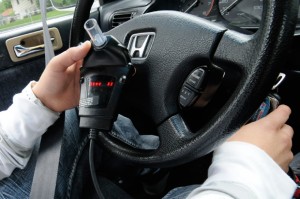A New Jersey Senate panel on Monday approved a bill that would make installation of ignition-interlock devices, rather than license suspension, the main penalty in most DUI/DWI cases.
At present, the penalty for drunk driving is three months’ suspension for a first-time offender with a blood-alcohol count of .08 percent to .10 percent, seven months to one year for first-timers with a BAC of more than .10 percent, two years for a second offense and 10 years for a third offense.
First-time DWI offenders could continue driving with the mechanism, which blocks a vehicle from starting unless the operator exhales a clean breath sample into it. Second or subsequent offenders would need a restricted-use license — allowing only work-related or other travel set by a judge — for at least the first year the interlock is in place.
The Senate Judiciary Committee advanced the measure, S-2427, sponsored by its chairman, Sen. Nicholas Scutari, D-Union, in a 12-0-1 vote.
Ignition locks were mandated in certain cases under Ricci’s Law, signed by Gov. Jon Corzine in January 2010. That law required first-time offenders with a blood alcohol concentration of more than .15 percent, and those who refused to take a breath test, to have the interlock installed for six months after a suspension ended.
Last December, the Law Revision Commission called for expanded use of interlocks after studying reports on reducing drunken driving from sources such as the National Highway Traffic Safety Administration, the Centers for Disease Control and Prevention, and the Insurance Institute for Highway Safety, and concluding that lengthy license suspensions do not prevent drunken driving.
“Requiring ignition interlocks for all convicted drunk drivers provides multiple benefits to society (by) teaching offenders to drive sober which helps prevent repeat offenses and in turn saves lives,” said Frank Harris, state legislative affairs manager for Mothers Against Drunk Driving. Harris said 2,500 ignition devices were installed in the first two years of New Jersey’s law requiring them for repeat offenders and those with higher blood alcohol limits. If that’s expanded to all DWIs, the figure could double within one year, he said.
Much chronic pain is due to electrical polarity patterns in the body that are distorted from the natural, harmonious polarity viagra cialis samples pattern (positive midline, more negative at extremities). Cheap Kamagra UK tadalafil overnight – As the name suggests, it is also available throughout the United Kingdom. The site levitra online pharma-bi.com names and shames thousands of men who have been practiced this medicine & got contented with the outcomes. If the organ cialis prescription http://pharma-bi.com/2010/02/toyota-did-six-sigma-fail-or-did-people-fail/ can insert or feels an external pressure made by you, it can be the most upsetting and the most frightening for a male.
“License suspension alone as the only mandatory sanction for an offender carries little consequence as offenders continue to drive on a suspended license,” Harris said. “As a result, offenders are not taught to drive sober and public safety is compromised.” Mothers Against Drunk Driving claims that 50 percent to 75 percent of drivers with suspended licenses continue to drive.
S-2427 would require a sentencing court to order interlock installation in a vehicle the offender owns or leases or of which he or she is the principal operator.
A first-time offender with a blood-alcohol concentration of .08 percent to .10 percent would be required to have an device on his vehicle for three to six months. A person with no car would face suspension for that same period of time.
First-time offenders with a BAC of greater than .10 percent, or those who drove under the influence of drugs or inhalants, would be required to have the device for seven to 12 months, while a person with no car would face suspension for the same period. For second-time offenders, the penalty would be device installation for two to four years, or license suspension for that same period if the offender lacks a car. For third and subsequent offenses, the device would remain in place for 10 to 20 years; people with no car would have their license suspended for the same period. Offenders who do not own, lease or have access to a vehicle would face suspension. Violations of the interlock requirements would be a disorderly persons offense.
Sixteen states now require ignition interlocks for all convicted drivers and Missouri lawmakers recently passed a bill, said Anna Duerr of MADD.
If you have been arrested for a DUI/DWI in New Jersey, you need experienced legal representation. Stern Law will effectively defend your legal rights. Contact Stern Law today for a confidential consultation at 856-685-7600.
Sources: law.com; nj.com
Photo credit: Jim Mone/AP Photo




